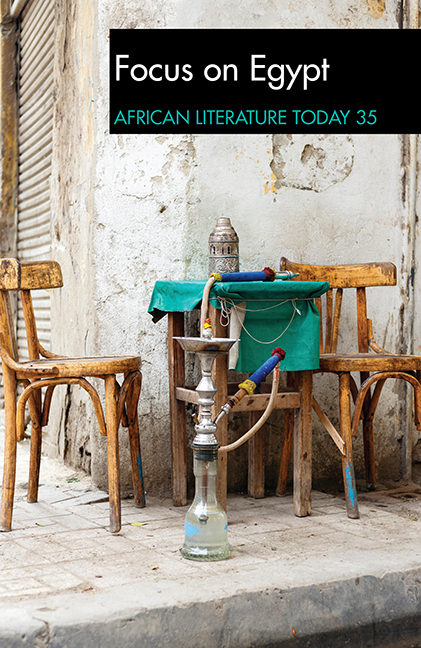Book contents
- Frontmatter
- Dedication
- Contents
- Notes on Contributors
- Foreword
- EDITORIAL ARTICLE
- ARTICLES
- Coping with a Failed Revolution: Basma Abdel Aziz, Nael Eltoukhy, Mohammed Rabie & Yasmine El Rashidi
- The Complications of Reading Egypt as Africa: Translation & Magdy el-Shafee's مترو (Metro)
- Narratives of the ‘Nubian Awakening’: Reclaiming Egypt's African Identity
- Frantz Fanon's Conceptualization of Decolonization in Sonallah Ibrahim's The Committee
- Romance as Epistemological Aesthetic in the Fiction of Ahdaf Soueif
- Literature as Prophecy: Re-Reading Yusuf Idris's The Cheapest Nights
- Travel & Discovery: Hopes for a New Egypt in Mohamed Salmawy's Butterfly Wings
- The Symbolic Relevance of the Use of the Eye in Nawal El Saadawi's Two Women in One & God Dies by the Nile
- African Epics: A Comparative Study of Sundiata & Al-Sirah al-Hilaliyyah
- Conversations with Nawal El Saadawi: Online interview
- FEATURED ARTICLES
- LITERARY SUPPLEMENT
- TRIBUTE
- REVIEWS
- Reviews of Nigerian Poetry
Coping with a Failed Revolution: Basma Abdel Aziz, NaelEltoukhy, Mohammed Rabie & Yasmine El Rashidi
from ARTICLES
Published online by Cambridge University Press: 24 August 2019
- Frontmatter
- Dedication
- Contents
- Notes on Contributors
- Foreword
- EDITORIAL ARTICLE
- ARTICLES
- Coping with a Failed Revolution: Basma Abdel Aziz, Nael Eltoukhy, Mohammed Rabie & Yasmine El Rashidi
- The Complications of Reading Egypt as Africa: Translation & Magdy el-Shafee's مترو (Metro)
- Narratives of the ‘Nubian Awakening’: Reclaiming Egypt's African Identity
- Frantz Fanon's Conceptualization of Decolonization in Sonallah Ibrahim's The Committee
- Romance as Epistemological Aesthetic in the Fiction of Ahdaf Soueif
- Literature as Prophecy: Re-Reading Yusuf Idris's The Cheapest Nights
- Travel & Discovery: Hopes for a New Egypt in Mohamed Salmawy's Butterfly Wings
- The Symbolic Relevance of the Use of the Eye in Nawal El Saadawi's Two Women in One & God Dies by the Nile
- African Epics: A Comparative Study of Sundiata & Al-Sirah al-Hilaliyyah
- Conversations with Nawal El Saadawi: Online interview
- FEATURED ARTICLES
- LITERARY SUPPLEMENT
- TRIBUTE
- REVIEWS
- Reviews of Nigerian Poetry
Summary
‘In war, truth is the first casualty.’ (Aeschylus)
‘Now I pick up the notebook chronicling that time,starting in the summer of 2010. On every page I takenote of the question marks. The wordtruth seems to repeat itselfmultiple times on each page. My handwriting is barelylegible.’ (Yasmine El Rashidi, Chronicle of aLast Summer, 147)
In 1992 HilaryKilpatrick remarked that ‘twenty years ago the Arabic novelwas regarded as practically synonymous with the Egyptiannovel’ (‘The Egyptian Novel from Zaynab to 1980’: 223).Though novel production had by 1992 become firmly rooted inmost Arab countries the ‘relatively longer history of thegenre’ in Egypt ‘enable[d] its different stages ofdevelopment to be distinguished and studied more easily thanis the case in countries where it has had a life of only twoor three decades’. Judging from several recent novels, a newstage in that development is taking place. The DemocracySpring, or ‘the Arab Spring’, that stretched roughly fromDecember 2010 to mid-2012 and seemed to cross many bordersalmost at the same time has unsurprisingly become apersistent focus for Egyptian novelists, and they areoffering the most cohesive set of responses to thatstartling turn in contemporary Arab history. Their creativespectrum of reflections on the initial hopes and ultimatedisillusionment range from ongoing defiance and hope, to aresigned acceptance, echoing Alphonse Karr's infamous quip:‘plus ça change, plus c'est la mêmechose’. Formalistically this range of responseshas expressed itself in self-deprecating wit, demonstrablein Nael Eltoukhy's Women of Karantina;surrealist abstraction and universalist imagery in BasmaAbdel Aziz's The Queue; a despairingdystopic vision of a relentlessly brutal future in MohammedRabie's Otared; and a personalphilosophical reflection on the nature of change and stasis,in Yasmine El Rashidi's Chronicle of a LastSummer. Only when such very different works areread together can one appreciate the complex psychologicalupheaval that is very much alive in Egyptian – and Arabic –society. For these writers, time itself becomes a centralcharacter, suggesting authors who seek in their craft anominal agency over a series of traumas that remain beyondpersonal control. El Rashidi is most traditional, creating aprotagonist writing as a memoirist who remembers herchildhood and traces her history up to the present.
- Type
- Chapter
- Information
- ALT 35: Focus on EgyptAfrican Literature Today 35, pp. 7 - 21Publisher: Boydell & BrewerPrint publication year: 2017

